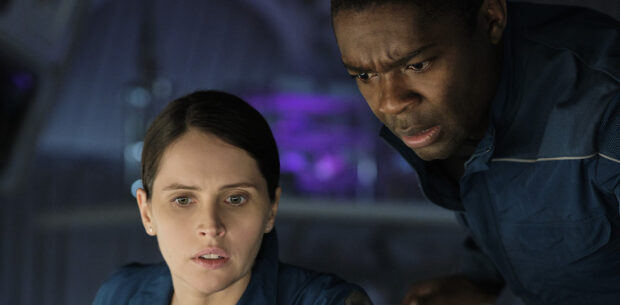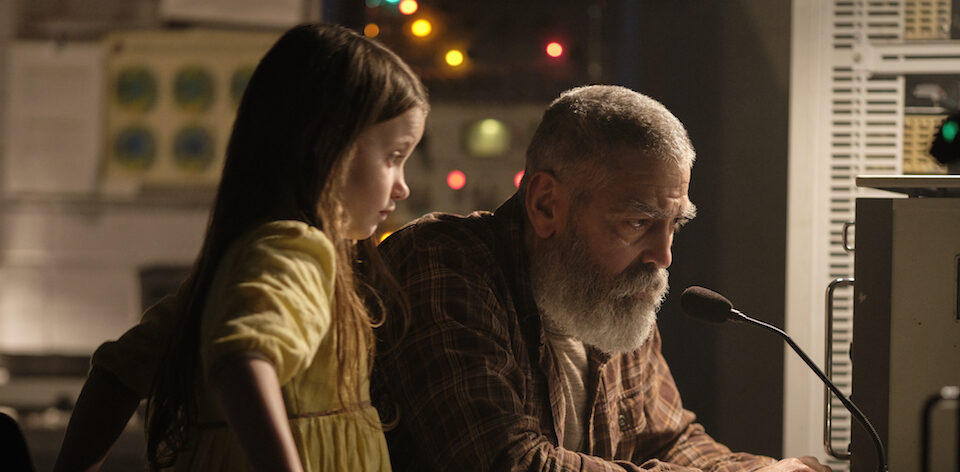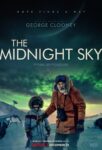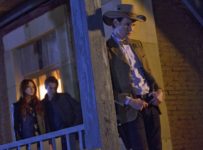George Clooney’s seventh feature as a director is arguably his most ambitious in scope. Yet despite its post-apocalyptic backdrop and sci-fi setting, it’s also one of his most intimate character-based pieces, one that somehow perfectly hits on the isolation of 2020.
Deliberately obscuring details of world events, and based on Lily Brooks-Dalton’s Good Morning, Midnight, Mark L. Smith’s script introduces us to scientist Augustine Lofthouse (George Clooney) three weeks after an undisclosed event in 2049. Left alone at an Arctic research station, he tries to contact the Aether, the last of Earth’s space borne vessels. He is soon surprised to find that a small girl (Caoilinn Springall) is also living in his station.
The larger world is slowly introduced through a series of flashbacks to a young Augustine (Ethan Peck) and a parallel story aboard the Aether. There the crew (Felicity Jones, David Oyelowo, Tiffany Boone, Demián Bichir, Kyle Chandler) makes their way home from exploring the possibility of colonising another planet, unaware of any fate that has befallen the Earth.

THE MIDNIGHT SKY recalls an era of meditative sci-fi. Think Andrei Tarkovsky’s Solaris by way of Duncan Jones’ Moon with a dash of Danny Boyle’s Sunshine. Clooney lets his two stories, one on the ground and one in space, play out at their own pace. Sitting at opposite ends of the sci-fi spectrum in a way, with one represent fatalism and the other a bit of hope, they intersect at critical junctures to show that they are mutually exclusive in our future.
More than anything, this is a beautifully photographed film. Martin Ruhe (Control, The American) fills every millimetre of his lens with Icelandic backdrops, including one shot in 50-mile-per-hour winds. The Lone Wolf and Cub journey of Augustine and Iris alternates between these exteriors and a studied interiority, punctuated by several action set-pieces that completely envelop the viewer. The Aether scenes are clean lines by comparison, save for the obligatory post-Gravity spacewalk sequence. Scenes on a fictional planet are as gorgeously rendered, and as stunning as the Icelandic vistas.
This remarkable cast plays out this timely story of isolation against the larger landscape of saving all of mankind. Yet it works because it’s primarily about individual relationships, and the need for connection. This feels authentic now more than ever. Indeed, speaking of authenticity, Jones’ actual pregnancy was worked into the script after production had started and it gives new dimensions to her character and portrayal.
There are elements of the denouement that will frustrate some viewers, while others may simply find the ending cold. In a Q&A with Cate Blanchett, Clooney said that some might see it as a film about regret while others will find the ending to be about redemption. Regardless, here is a smart bit of sci-fi that funnels our hopes and fears for the future into a microcosm, and one suspects multiple viewings will be required to unpick all of its nuances.
2020 | US | DIRECTOR: George Clooney | WRITER: Mark L. Smith| CAST: George Clooney, Felicity Jones, David Oyelowo, Tiffany Boone, Demián Bichir, Kyle Chandler, Caoilinn Springall | DISTRIBUTOR: Netflix| RUNNING TIME: 122 minutes | RELEASE DATE: 10 December 2020 (Limited theatrical), 23 December 2020 (Netflix)





